
How can we improve our support to empower dads? Reflections from the Road
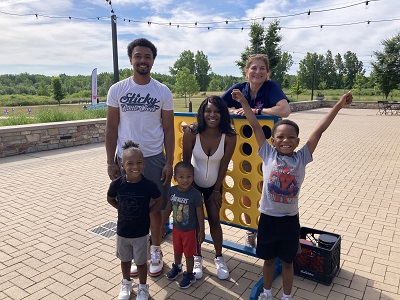 I met some amazing people while on the Re-Connect Tour 2022 this summer and came away with new friendships, renewed energy, and lasting memories.
I met some amazing people while on the Re-Connect Tour 2022 this summer and came away with new friendships, renewed energy, and lasting memories.
Early into the two-month tour I began thinking a lot about dads. After numerous opportunities to spend time with several fathers and husbands during stops and Promise Walks along the tour—including Jay Korey in Pittsburgh and J.P. Powell in New Jersey, who each lost a baby to preeclampsia; Brian Gravelle in New York, whose wife died from postpartum preeclampsia four years ago; and Indianapolis ice cream shop owner Dan Feltman, who lost his firstborn nine years ago—I became acutely aware that we need to do more for fathers going through this experience with us.
It was an eye-opening experience to listen and talk frankly with dads who are processing fear, helplessness, frustration, and even unexpected emotional growth, some fresh off their family’s experience with preeclampsia and some more than a decade past the moment that changed their lives forever.
The talks made me think of my own father, who had trouble understanding the depth of my despair when my daughter died at 29 weeks in 1998. We lived 3,000 miles from my parents, so it was over a year later before I could take him to his granddaughter’s grave. Seeing her name engraved on the granite moved the ethereal to the tangible… and moved him to tears and the realization of what—and who—our family lost.
At the time when we lost our daughter, my husband’s apparent lack of grief almost tore us apart…until five years later when his unresolved feelings of responsibility in our daughter’s death spilled out in a trauma recovery seminar. The unspoken burden of his failure as my (and our baby’s) health advocate and his fear over losing me was unloaded and, with the help of therapy to process the unimaginable death of our child, we healed parts of our relationship that had flickered in and out of shadow and light, never before fully acknowledged.
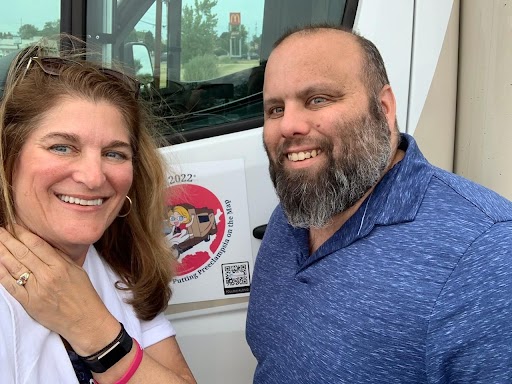 Brian Gravelle (pictured right), whose wife Lian died in 2018, activated his political muscle to pass a New York state law called "Lian's Law" requiring preeclampsia education for consumers, patients, and healthcare providers. He also harbors a more profound agenda to teach husbands and partners what they need to know to save their beloved’s life.
Brian Gravelle (pictured right), whose wife Lian died in 2018, activated his political muscle to pass a New York state law called "Lian's Law" requiring preeclampsia education for consumers, patients, and healthcare providers. He also harbors a more profound agenda to teach husbands and partners what they need to know to save their beloved’s life.
“I didn’t know. I didn’t know,” he lamented to me as we sat over lunch in an upstate New York diner. Later, he walked me back to my RV to send me on my way and shared that his ultimate dream was to establish special programs dedicated to educating expectant fathers.
“We sit around feeling foolish during prenatal appointments,” he explained. “Yes, we attend these appointments with our wives to demonstrate our love and support, but we feel irrelevant and frankly uncomfortable. Do I avert my eyes while you’re examining my wife?”
Brian challenged me: just like fathers are drilled on delivery support strategies, they should also be taught the maternal warning signs. How about if the dads are taken into a special education session just for them? Here’s how you can help your wife, especially after she and the baby come home. She may be experiencing physical symptoms that are foreign, and presumed to be normal. So much of Brian’s experience mirrored other widowers I’ve met over the years who struggle with the guilt of feeling as if they could do nothing to prevent their wives’ death.
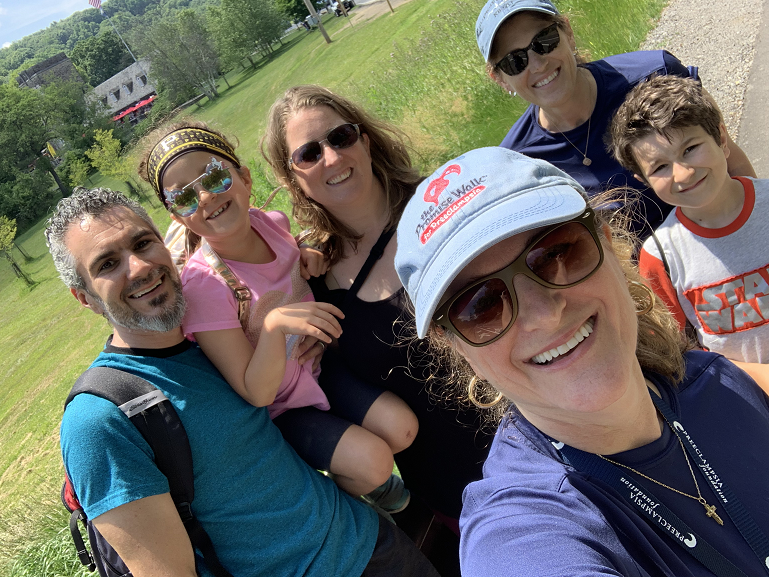 Jay Korey (pictured left), who wrote about his experience as a dad whose baby daughter died (see “Holding It All Together” on our website), shared with me that the mental therapy that he underwent, in addition to the counseling that he and his wife, Mary, shared, gave him the boost he needed to get past some of his darkest days. “I wish I could write my story differently because I see it through a healthier lens now,” he said. I responded that the story he wrote years ago was accurate and honest. Growth and an evolution in perspective is also part of the healing journey.
Jay Korey (pictured left), who wrote about his experience as a dad whose baby daughter died (see “Holding It All Together” on our website), shared with me that the mental therapy that he underwent, in addition to the counseling that he and his wife, Mary, shared, gave him the boost he needed to get past some of his darkest days. “I wish I could write my story differently because I see it through a healthier lens now,” he said. I responded that the story he wrote years ago was accurate and honest. Growth and an evolution in perspective is also part of the healing journey.
Sarah Waun wiped away tears as she verbalized their experience to me, for the first time, at the Grand Rapids, MI Promise Walk. It wasn’t until she wrote a very long narrative of their story, and read it out loud to her husband, Dan, that he fully recognized his own emotions, even a year later. He broke down crying, relieved that his own pent-up emotions finally made sense. “It was cathartic, hearing her recount everything,” he explained. I asked Dan if a support group specifically for dads could be beneficial. He nodded emphatically.
Over and over, the dads I spoke with reflected on feeling marginalized and helpless during the harried hours, and sometimes days, after preeclampsia was diagnosed. Quick decisions had to be made, often without a full understanding of what was happening, why it was happening, and what was at stake. Other family members—grandparents, sisters, and responsible relatives—similarly are thrust into an emergency situation where they don’t speak the medical language. Sometimes there is an unhealthy total acquiescence to the healthcare providers, and other times, a tense distrust of the medical teams’ competence. Dads may wonder: “Am I supposed to put all my faith in you? Am I supposed to challenge what you’re doing? Will I be viewed as annoying, and thus ignored, if I question everything?”
In talking with these men, not one of them said these words verbatim, but their collective message came through loud and clear: “I’m not an idiot. I’m supposed to be the problem solver in this family. I shouldn’t have to feel utterly impotent. Please help me help my family.”
It strengthened my resolve that our team finds more ways to assist and engage dads throughout the pregnancy and postpartum preeclampsia experience. Where can we start?
- Design prenatal and postpartum maternal warning signs education geared toward dads as partners in the pregnancy experience
- Train healthcare providers to include dads as engaged, empowered, and educated advocated during a crisis like preeclampsia
- Provide dads with tailored emotional support and grief therapy after the event
I am open to more ideas so feel free to share your thoughts and experiences with us.
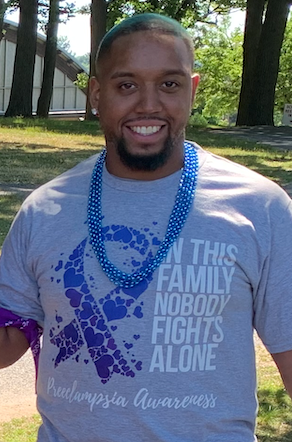 At the Boston Promise Walk in June, participant Raul Infante (pictured left) proudly wore his family’s mantra on his t-shirt, proclaiming: “In this family, nobody fights alone.” With their “abuela” (Spanish for grandmother) leading the pack, and two of her three grown daughters having experienced severe preeclampsia with preterm deliveries for their babies, Raul’s role as husband to one of the preeclamptic mothers and ‘pillar of strength’ was apparent as he exuberantly took photos and videos of their day, clearly the historian of the family.
At the Boston Promise Walk in June, participant Raul Infante (pictured left) proudly wore his family’s mantra on his t-shirt, proclaiming: “In this family, nobody fights alone.” With their “abuela” (Spanish for grandmother) leading the pack, and two of her three grown daughters having experienced severe preeclampsia with preterm deliveries for their babies, Raul’s role as husband to one of the preeclamptic mothers and ‘pillar of strength’ was apparent as he exuberantly took photos and videos of their day, clearly the historian of the family.
We can all adopt that mantra, especially when it comes to those who experience complications due to preeclampsia:
Nobody in our community—our family of survivors, spouses, and partners—fights alone!
Related Articles

A visual approach to understand preeclampsia patient experiences from the Society for Maternal-Fetal Medicine & Preeclampsia Foundation

Doulas can help bridge the gap for any mom, but especially those most vulnerable to maternal illness and death.

Stories of our brave women and families who have been affected by preeclampsia and HELLP syndrome. Please note that due to a technical issue, we are currently fixing the images on this page.
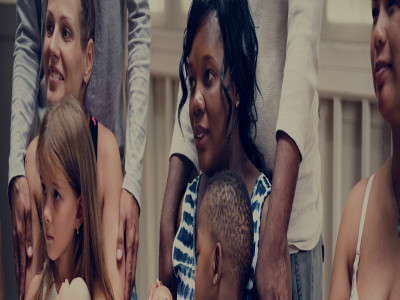
What is Preeclampsia? Preeclampsia is a hypertensive disorder that occurs only during pregnancy and the postpartum period and affects both the mother and the unborn baby. Affecting at least...
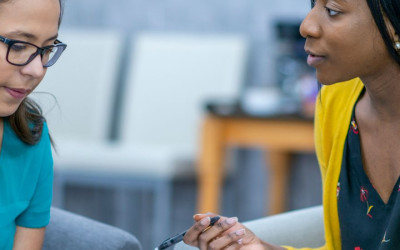
Shattered Expectations: What happens after the unexpected? You may have received the unexpected news that you have preeclampsia or another hypertensive disorder of pregnancy. Maybe labor complic...
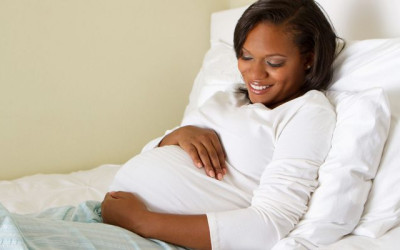
Even after more than twenty years, Mavis “Mae” Stephens, a 3x preeclampsia survivor, vividly remembers the challenges she faced during her pregnancy with her second son. She did everything...

Recientemente, me encontré con una publicación en las redes sociales señalando la crisis de salud maternal desde la perspectiva de una mujer negra. Una persona respondió a...
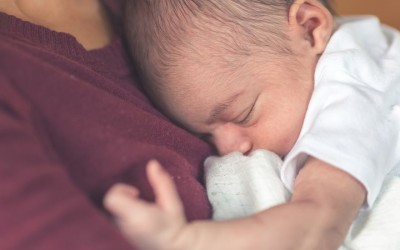
Meghan Markle is opening up about her experience with postpartum preeclampsia in the debut episode of her new podcast, Confessions of a Female Founder. In the episode with her first guest and clo...
1732072344.png)
While the Preeclampsia Foundation has been championing patient advocacy and representation for all families affected by hypertension in pregnancy throughout our 25 year history, we recognized the uniq...

